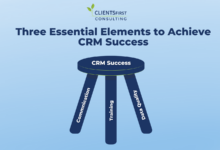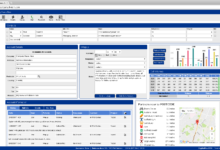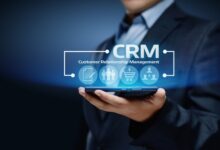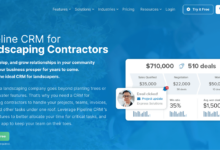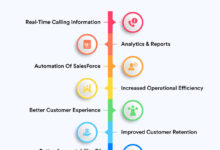Best CRM Software for Business Success
Best CRM software for business isn’t just about software; it’s about transforming how you connect with customers. Finding the right CRM can streamline operations, boost sales, and ultimately drive your business forward. This guide cuts through the jargon, providing practical advice to help you choose the perfect CRM to fit your specific needs, from small startups to established enterprises. We’ll explore key features, pricing models, integration capabilities, and user experience to help you make an informed decision.
We’ll delve into the crucial aspects of choosing a CRM, examining how different business types—e-commerce, SaaS, B2B—have unique requirements. We’ll also look at the essential features for sales, marketing, and customer service teams, comparing the strengths and weaknesses of various deployment options, including cloud-based and on-premise solutions. Security and data privacy are paramount, so we’ll cover the essential safeguards to consider before making your choice.
Defining Business Needs for CRM Software
Choosing the right CRM software hinges on understanding your business’s unique needs. A one-size-fits-all approach rarely works, and selecting the wrong system can lead to wasted resources and decreased efficiency. This section outlines how to identify those needs based on your business’s characteristics, size, and type.
Characteristics of Successful Businesses
Three key characteristics consistently found in successful businesses are strong customer relationships, efficient internal processes, and data-driven decision-making. A robust CRM system directly supports all three. Strong customer relationships are built through personalized interactions and effective communication, which a CRM facilitates. Efficient internal processes are streamlined through automation and centralized data management, key CRM features. Finally, data-driven decision-making relies on accurate, readily available data, a core function of any good CRM.
CRM Needs Vary by Business Size
Small businesses often require a simple, user-friendly CRM with basic contact management, sales tracking, and communication tools. They might prioritize affordability and ease of implementation over extensive customization options. Medium-sized businesses typically need more advanced features, such as sales pipeline management, marketing automation, and reporting capabilities. Scalability becomes a crucial factor. Large enterprises require highly customizable, integrated CRM systems that can handle vast amounts of data and support complex workflows across multiple departments and locations. They often integrate their CRM with other enterprise systems.
CRM Functionalities for Different Business Types
E-commerce businesses need CRM systems with strong order management capabilities, integration with e-commerce platforms, and robust customer support features, including tools for handling returns and resolving issues. SaaS businesses require CRMs that can track customer usage, manage subscriptions, and provide insights into customer churn. B2B businesses often prioritize features that support complex sales cycles, such as opportunity management, lead scoring, and account-based marketing.
Essential CRM Features by Team
| Feature | Sales Team | Marketing Team | Customer Service Team |
|---|---|---|---|
| Contact Management | Essential | Essential | Essential |
| Lead Management | Essential | Essential | Important |
| Sales Pipeline Management | Essential | Important | Not Essential |
| Marketing Automation | Important | Essential | Not Essential |
| Reporting & Analytics | Essential | Essential | Important |
| Customer Support Ticketing | Important | Important | Essential |
Top CRM Software Features
Choosing the right CRM involves understanding its core functionalities. A robust CRM isn’t just a contact list; it’s a strategic tool for driving business growth by streamlining operations and providing valuable insights. This section outlines key features that contribute to a successful CRM implementation.
Five essential CRM features significantly impact a business’s ability to manage customer relationships, nurture leads, and ultimately, boost sales. These features, when properly utilized, create a more efficient and data-driven sales process, leading to improved customer satisfaction and increased profitability.
Essential CRM Features and Their Importance
The following five features are considered fundamental for most businesses looking to leverage a CRM effectively. Each plays a distinct yet interconnected role in optimizing business processes and achieving growth objectives.
- Contact Management: A centralized database for storing and managing all customer information (contact details, interaction history, purchase history, etc.). This ensures consistent and personalized communication, preventing data silos and improving customer service.
- Lead Management: Tools for tracking potential customers from initial contact to conversion. This includes features for lead scoring, assignment, and nurturing, helping prioritize high-potential leads and improve sales conversion rates.
- Sales Pipeline Management: Visual representation of the sales process, allowing tracking of deals at each stage. This provides insights into sales progress, identifies bottlenecks, and enables proactive management of the sales cycle.
- Automation Features: Automating repetitive tasks such as email marketing, lead assignment, and data entry, freeing up sales teams to focus on higher-value activities. This improves efficiency and reduces the risk of human error.
- Reporting and Analytics: Generating reports and dashboards to analyze sales performance, customer behavior, and campaign effectiveness. This data-driven approach enables informed decision-making and continuous improvement.
Benefits of Contact, Lead, and Sales Pipeline Management
These three features work synergistically to optimize the sales process and enhance customer relationships. The integration of these functionalities within a CRM platform creates a powerful system for managing the entire customer journey.
Effective contact management provides a single source of truth for all customer data, eliminating inconsistencies and improving communication. Lead management ensures that sales teams focus on the most promising leads, maximizing their time and resources. Sales pipeline management offers a clear overview of the sales process, enabling proactive identification and resolution of bottlenecks, resulting in faster deal closure and improved revenue.
Automation Features Across Different CRM Platforms
Different CRM platforms offer varying levels of automation capabilities. Some platforms provide basic automation features like automated email responses and reminders, while others offer more advanced capabilities, such as workflow automation and integration with other business applications. The level of automation offered often depends on the platform’s pricing tier and features.
For example, a smaller business might use a CRM with basic email automation, while a larger enterprise might utilize a platform with advanced workflow automation to manage complex sales processes. The choice depends on the specific needs and scale of the business.
CRM Reporting and Analytics for Better Decision-Making
CRM reporting and analytics provide crucial insights into various aspects of business performance, enabling data-driven decision-making. These features allow businesses to track key metrics such as sales conversion rates, customer acquisition costs, and customer lifetime value.
For instance, a company might use CRM analytics to identify which marketing campaigns are most effective, or to pinpoint areas where the sales process can be improved. By analyzing sales data, businesses can understand customer behavior, identify trends, and make informed decisions to optimize their strategies and improve profitability. For example, a report showing a significant drop in conversion rates from a specific marketing campaign might prompt a review of the campaign’s messaging or targeting.
Pricing and Deployment Models
Choosing the right CRM software involves careful consideration of not only its features but also its cost and how it will be implemented within your business. Pricing structures and deployment methods significantly impact the total cost of ownership and the overall user experience. Understanding these aspects is crucial for making an informed decision.
CRM Pricing Models
Different CRM vendors offer various pricing models to cater to businesses of all sizes and budgets. These models typically fall into a few key categories. The best option will depend on your company’s specific needs and financial capabilities.
| Pricing Model | Description | Advantages | Disadvantages |
|---|---|---|---|
| Subscription (Monthly/Annual) | Recurring payments for access to the software. Often tiered based on features and number of users. | Predictable budgeting, automatic updates, scalability. | Ongoing expense, potential for cost increases over time, dependency on vendor. |
| One-Time Purchase | A single upfront payment for a perpetual license. | Lower initial cost (potentially), ownership of the software. | No updates or support included (usually), higher initial investment, potential for outdated technology. |
| Per-User Licensing | Cost is determined by the number of users accessing the system. | Scalable pricing, pays only for what is used. | Can become expensive as user base grows. |
| Tiered Pricing | Different feature sets and user limits offered at varying price points. | Flexibility to choose a plan that matches your needs. | Can be complex to compare options. |
Cloud-Based vs. On-Premise CRM Deployment
The choice between cloud-based (Software as a Service – SaaS) and on-premise CRM deployments significantly impacts your infrastructure, costs, and maintenance.
Cloud-Based CRM (SaaS): Software is hosted on the vendor’s servers and accessed via the internet. This eliminates the need for on-site servers and IT infrastructure.
- Advantages: Lower upfront costs, accessibility from anywhere with internet access, automatic updates, scalability, reduced IT maintenance.
- Disadvantages: Reliance on internet connectivity, potential security concerns (though reputable vendors have robust security measures), vendor lock-in, limited customization in some cases.
On-Premise CRM: Software is installed and maintained on your own servers within your organization’s infrastructure.
- Advantages: Greater control over data and security, more customization options, potentially lower long-term costs (depending on initial investment), no reliance on internet connectivity.
- Disadvantages: High upfront costs for hardware and software, ongoing IT maintenance and support required, limited accessibility (only from within your network), difficulty scaling.
Total Cost of Ownership (TCO) for CRM Software
Evaluating the TCO is crucial for making a sound financial decision. It goes beyond the initial purchase price and includes factors like:
- Software licensing fees: Subscription costs, one-time purchase price, or per-user fees.
- Implementation costs: Consultancy fees, data migration, training, and customization.
- Ongoing maintenance and support: Technical support, updates, and bug fixes.
- Hardware costs (for on-premise deployments): Servers, network equipment, and storage.
- IT staff costs (for on-premise deployments): Salaries for personnel managing and maintaining the system.
- Integration costs: Connecting the CRM with other business systems.
CRM Software Pricing Plan Comparison
This comparison uses hypothetical examples to illustrate the differences in pricing plans. Actual pricing varies by vendor and specific features.
| CRM Software | Plan Name | Price/Month | Features | Limitations |
|---|---|---|---|---|
| Salesforce | Essentials | $25/user | Basic sales and service features, limited automation. | Fewer users allowed, limited integrations. |
| HubSpot | Starter | $0/user | Contact management, email marketing, basic CRM features. | Limited features compared to paid plans, HubSpot branding. |
| Zoho CRM | Standard | $14/user | Salesforce automation, workflow rules, advanced reporting. | Fewer users and features compared to higher-tier plans. |
Integration Capabilities
A CRM’s effectiveness hinges significantly on its ability to integrate with other business software. Seamless data flow between different systems streamlines operations, improves data accuracy, and ultimately boosts productivity. Effective integration minimizes manual data entry, reduces errors, and provides a holistic view of customer interactions across all touchpoints.
Choosing a CRM with robust integration capabilities is crucial for maximizing its return on investment. This section explores the importance of various integration methods and their impact on business processes.
Common Integrations with CRM Software
Integrating your CRM with other business systems unlocks significant advantages. Three common integrations are with accounting software, marketing automation platforms, and e-commerce platforms. Connecting these systems creates a unified view of the customer journey, improving efficiency and decision-making.
- Accounting Software (e.g., Xero, QuickBooks): Integrating your CRM with accounting software automates invoice generation, tracks payments, and provides real-time financial insights linked to specific customer interactions. This improves financial reporting accuracy and streamlines the reconciliation process. For instance, a sales team can see a customer’s payment history directly within the CRM, enabling them to tailor their approach and potentially offer more tailored services or upselling opportunities.
- Marketing Automation Platforms (e.g., HubSpot, Mailchimp): This integration allows for automated marketing campaigns triggered by customer actions within the CRM. For example, a new lead can automatically be added to a welcome email sequence, or a customer’s purchase history can trigger targeted promotions. This personalized approach enhances customer engagement and boosts marketing ROI.
- E-commerce Platforms (e.g., Shopify, Magento): Integrating your CRM with your e-commerce platform provides a complete picture of customer online behavior. This includes browsing history, purchase details, and website interactions, enriching the customer profile within the CRM. This allows for more targeted marketing efforts and personalized customer service.
API Integration and Data Exchange
Application Programming Interfaces (APIs) are the backbone of seamless CRM integration. APIs allow different software systems to communicate and exchange data automatically, eliminating manual data entry and minimizing errors. The impact on data exchange is profound: data is updated in real-time across all integrated systems, providing a single source of truth and ensuring data consistency. This is critical for accurate reporting and informed decision-making. A well-designed API facilitates a smooth flow of information, preventing data silos and enhancing the overall efficiency of the business.
Integrating CRM with Email Marketing Platforms
Integrating a CRM with an email marketing platform typically involves connecting the two systems through their respective APIs. This process usually requires setting up an API key and configuring the integration settings within both platforms. Once connected, data, such as customer contact details and purchase history from the CRM, can be automatically synchronized with the email marketing platform. This allows for the creation of highly targeted email campaigns based on customer segmentation and behavior. For example, a customer who recently purchased a product might receive a follow-up email with product recommendations, while a customer who hasn’t engaged in a while might receive a re-engagement email. This automation significantly improves marketing efficiency and personalization.
Seamless Integration and Operational Efficiency
Seamless integration dramatically enhances data consistency by eliminating data duplication and discrepancies across different systems. A single, unified view of customer data ensures that all departments have access to the same information, reducing confusion and improving collaboration. This leads to improved operational efficiency by automating tasks, reducing manual data entry, and streamlining workflows. For instance, automated lead assignment, triggered by form submissions on a website, ensures that leads are handled promptly and efficiently, maximizing conversion rates. The result is a more agile and responsive business that can adapt quickly to changing customer needs.
Security and Data Privacy
Choosing a CRM involves more than just finding user-friendly features; robust security and data privacy are paramount. Protecting your customer data is not only ethically responsible but also legally mandated in many jurisdictions. A breach can lead to significant financial losses, reputational damage, and legal repercussions. This section details the critical security aspects to consider when selecting a CRM platform.
Data encryption and access control are fundamental to a secure CRM system. Reputable providers employ various methods to safeguard sensitive information, ensuring only authorized personnel can access specific data. This protection extends beyond simple passwords; it encompasses multi-factor authentication, data masking, and encryption both in transit and at rest.
Data Encryption and Access Control
Data encryption transforms readable data into an unreadable format, rendering it useless to unauthorized individuals. This is crucial for protecting customer Personally Identifiable Information (PII), such as names, addresses, and financial details. Access control mechanisms, such as role-based permissions, further restrict data access based on an individual’s role within the organization. For example, a sales representative might have access to customer contact information and purchase history, while a marketing manager might only see aggregated data for campaign analysis. Robust audit trails track all data access and modifications, providing a transparent record of activities for compliance and security monitoring.
Compliance Requirements
Several regulations govern how businesses handle personal data. The General Data Protection Regulation (GDPR) in Europe and the California Consumer Privacy Act (CCPA) in the United States are prominent examples. GDPR mandates stringent data protection measures, including obtaining explicit consent for data processing and providing individuals with the right to access, rectify, and erase their data. CCPA grants California residents similar rights, including the right to know what data is collected about them and the right to opt-out of data sales. A compliant CRM system must adhere to these regulations, including providing features that facilitate data subject requests and demonstrating compliance through comprehensive documentation. Failure to comply can result in substantial fines and legal action.
Security Considerations Checklist
Before selecting a CRM platform, carefully review these security considerations:
- Data Encryption: Verify that the CRM provider uses robust encryption methods, both in transit (using HTTPS) and at rest (using encryption at the database level).
- Access Control: Ensure the system offers granular access control features, allowing you to define specific permissions for different user roles.
- Authentication Methods: Check if multi-factor authentication (MFA) is available, significantly enhancing security beyond simple passwords.
- Data Backup and Recovery: Inquire about the provider’s data backup and recovery procedures to ensure business continuity in case of data loss or system failure.
- Compliance Certifications: Look for certifications such as ISO 27001 (information security management) or SOC 2 (service organization controls), demonstrating the provider’s commitment to security best practices.
- Regular Security Audits: Ask about the frequency and scope of the provider’s security audits and penetration testing.
- Data Residency and Transfer: Understand where your data will be stored and how it will be transferred, especially if you operate in multiple jurisdictions with varying data protection laws.
- Incident Response Plan: Ask about the provider’s incident response plan in case of a security breach. A well-defined plan is crucial for minimizing the impact of any incident.
Final Conclusion
Choosing the best CRM software for your business is a significant decision, impacting everything from sales efficiency to customer satisfaction. By carefully considering your business needs, evaluating key features, and understanding the various pricing and deployment models, you can select a solution that empowers your team and drives sustainable growth. Remember, the right CRM is an investment in your future success—one that pays dividends in improved efficiency, stronger customer relationships, and ultimately, a healthier bottom line. Don’t hesitate to explore the FAQs below to address any lingering questions.
